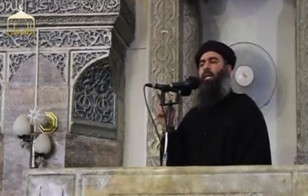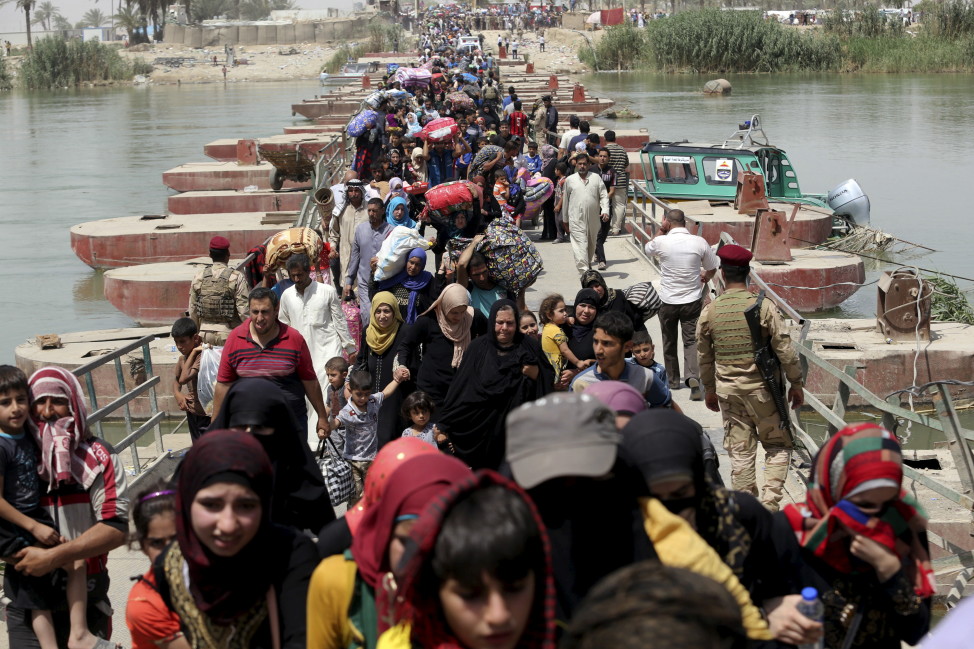By Barbara Slavin
As 2015 fades into history, so too do are forecasts that the group that calls itself the Islamic State (ISIS) is still on the rise in the Middle East.
Iraqi forces supported by the United States are shrinking the ISIS “caliphate” in Iraq and Syria to such an extent that Islamic State leader Abu Bakr al-Baghdadi felt obliged to give a pep talk to jihadis over Christmas.

Islamic State leader Abu Bakr al-Baghdadi makes his first public appearance at a mosque in the center of Iraq’s second city, Mosul, according to a video posted on the Internet on July 5, 2014. (Reuters)
“Be confident that God will grant victory to those who worship him, and hear the good news that our state is doing well,” Baghdadi said in an audio message broadcast online.
A day later, a U.S.-backed force of Syrian Kurds and Arabs captured the Tishrin dam, severing a major supply route across the Euphrates river just 15 miles from the ISIS stronghold of Raqqa.
Then on Monday, the Iraqi army announced that its forces had wrested control of the center of Ramadi seven months after ISIS occupied the capital of Iraq’s Anbar province. U.S. officials praised the news, while cautioning that parts of Ramadi remain in ISIS hands along with other territory in western Iraq and eastern Syria.
“Even with this success, the fight against ISIL is far from over,” Defense Secretary Ashton Carter said in a statement. “The United States military stands ready to support our Iraqi partners and the rest of the international coalition as we build on today’s progress and continue to strike ISIL on multiple fronts until we achieve their inevitable defeat.”
When the latest successes are added to previous victories – capturing Sinjar and cutting the main road between Raqqa and Mosul, recapturing the Sunni town of Tikrit and the Baiji oil refinery — it is clear that Baghdadi’s bluster is just that. In fact, ISIS has lost 40 percent of the territory it had seized in Iraq over the past year.
Michael Knights, an expert on Iraq at the Washington Institute for Near East Policy, told this reporter that the Ramadi operation “is an important confidence-building step” for Iraq’s security forces and the government of Prime Minister Haider al-Abadi.
While “in objective terms this is merely reversing a defeat,” added Knights, “in subjective terms this can and will be spun as a major Iraqi victory, which is exactly how you restore the morale of a broken force.”
To paraphrase Republican presidential hopeful Donald Trump, nobody loves a loser. Nibbling away at the caliphate undermines the ISIS narrative that it is advancing toward an apocalyptic battle between the forces of Islam and “Crusaders” that ISIS will win. When combined with belated Turkish efforts to seal the border with Syria, the losses should diminish the appeal of the militants to alienated foreign youth, and decrease the supply of recruits needed for ISIS to continue to hold territory.

Displaced Sunni people fleeing the violence in Ramadi, Iraq cross a bridge on the outskirts of Baghdad, May 24, 2015. (Reuters)
Meanwhile, Syrians and Iraqis continue to flee ISIS-controlled territory, seeking refuge in neighboring countries and in Europe. A shrinking population deprives ISIS of revenues from taxation and extortion, while American airstrikes are diminishing proceeds from the sale of refined oil products.
Where ISIS could once provide basic services to those living under its control, now gasoline, cooking oil and electricity are in scarce supply in western Iraq, according to a new study by the website Iraq Oil Report. It is harder to find truck drivers willing to transport oil given stepped up bombardment by the U.S.-led coalition.
That said, there is still much work to be done to defeat ISIS definitively. In both Iraq and Syria, Sunni populations must be convinced that they will be safer under non-ISIS rule. While opinion polls show that only a minority share ISIS ideology, residents of cities such as Mosul fear “liberation” by forces controlled by Iraq’s Shiite-led government.
Ramadi will be a key test case.
It is incredibly important that the Iraqi army – not Shiite militias – is leading the battle there, unlike the situation in Tikrit, where the militias played a large and largely negative role. Sunni tribesmen are also participating in the Ramadi campaign in an echo of the “Anbar awakening” that defeated al-Qaida in Iraq, the precursor of ISIS, in ’06 to ’07.
If pro-Baghdad forces can establish complete control and oust ISIS fighters from Ramadi and avoid revenge attacks by Shiite militias against local Sunnis, they will have a much better chance to recapture Mosul, Iraq’s second largest city and the place where Baghdadi declared his caliphate in 2014.
Ramadi could become “a stepping stone to Mosul, a sidebar that actually taught us [Iraqi Security Forces/Coalition] a few useful lessons before we try to take on the main event – Mosul,” said Knights.

Iraqi security forces search a building in the government complex in central Ramadi, 115 kilometers west of Baghdad, Iraq on December 27, 2015 (AP).
While the fighting proceeds, Abadi also needs to redouble efforts to create a more inclusive government in Baghdad that shares power and resources more equitably with Sunnis and Kurds.
Syria poses bigger challenges because of the atrocities committed by the Alawite regime of President Bashar al-Assad since the uprising against him began in 2011 and the profusion of outside actors. The United States, Russia, Saudi Arabia, Iran and Turkey revived a diplomatic process in 2015. Negotiations are due to take place in late January between representatives of Assad regime and Sunni opposition groups.
While there is no agreement yet on Assad’s fate, the process now has the backing of a U.N. Security Council resolution. The U.N. has also been able to negotiate a series of localized cease-fires allowing exchanges of fighters between government and opposition forces.
However, a major complication is the continued bombardment of non-ISIS Sunni areas by Russia and the Assad regime. It is also uncertain to what extent Russian President Vladimir Putin and the Iranian government will be willing to work toward a Syria solution with time running out for the current U.S. administration
And despite clear progress in the ISIS heartland, followers of the group have spread to Libya, Yemen, Afghanistan and West Africa like malignant cells that remain in a cancer patient’s bloodstream after surgery. Returned foreign fighters have carried out terrorist attacks in Europe, and self-radicalized loners, such as the Muslim couple in San Bernardino, California, have proven their ability to conduct mass killings in the United States.
In a U.S. presidential election year, candidates are stressing the threat of terrorism to prove themselves “tougher” than the current occupant of the White House. But they offer few new ideas.
As he enters his last year in office, President Barack Obama can blunt his critics with concrete evidence that his cautious, calibrated strategy against ISIS is paying off without risking the lives of more American military personnel.

